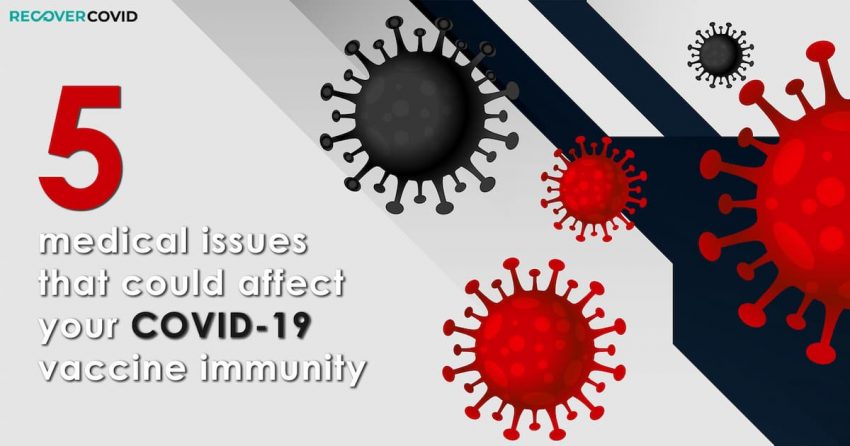Five medical issues that could affect your COVID-19 vaccine immunity
The COVID-19 vaccines have been hailed as miracles, however, they might not be a cure-all for some people who have illnesses that impair their immune systems. This is due to the possibility that the immunizations did not provide them with enough antibodies to protect them from the new coronavirus.

A strong immune system is frequently compared to a vast army battling illnesses and viruses. However, at least 10 million Americans have immune systems that are weakened, often as a result of a medical condition that necessitates the use of anti-inflammatory drugs or other comparable therapies. They include cancer patients, those with lupus, multiple sclerosis, rheumatoid arthritis, and HIV/AIDS, as well as organ transplant recipients who are given a variety of medications to avoid the rejection of the transplanted organs.
Their vulnerability could undermine the assurance that everyone will be immune to COVID-19 thanks to the immunizations that are currently being administered to millions of people across the nation.
Doctors who treat patients with these diseases typically advise them to get vaccinated against COVID since any protection is preferable to none.
But authorities advise persons with these problems to speak with their medical professionals before receiving a vaccination, as does the Centers for Disease Control and Prevention (CDC). The CDC also advises patients with weakened immune systems to think about continuing COVID-19 measures after receiving the vaccine, including as donning a mask and keeping six feet away from people who do not reside with them.
Additionally, doctors advise those who have these disorders to ask their family members and friends to get immunized.
5 Medical Conditions That Can Impair COVID Immunity
- Cancer
The immune response of cancer patients may be impacted by their underlying medical condition as well as their immunosuppressive treatment plans. Additionally, people with blood malignancies may be more susceptible to fatal long-term infections than people with solid tumors. They often have fewer amounts of immunological cells that make antibodies, which explains this.
Chemotherapy, stem cell, or bone marrow transplants are a few cancer treatments that can decrease the immune system.
The COVID-19 vaccines will provide some protection for the majority of immunocompromised cancer patients, but they should take steps to reduce their exposure to the novel coronavirus. Studies are now being conducted to ascertain whether and when a booster shot may be necessary.
- HIV/AIDS
According to estimates, 1.2 million Americans are infected with the HIV virus. HIV can develop into AIDS, also known as acquired immunodeficiency syndrome if left untreated. However, since the epidemic’s worst years in the middle of the 1980s, new infections have decreased by more than two-thirds. Existing instances are being stabilized by new medications.
Up to 70% of patients with HIV/AIDS are taking drugs that have preserved their immune systems.
Because the possible advantages outweigh the potential hazards, HIV-positive individuals should abide by the general recommendations that COVID-19 vaccinations should be given, regardless of their CD4 or viral load.
- Transplants
In 2020, medical professionals carried out 39,000 organ transplants, with kidney transplants dominating the list. Most people who receive new organs take drugs that stop the immune system from attacking the donor organ. The same medications seem to weaken the vaccine’s antibodies.
“If the immune system is too active, it attacks the new organ.”
- Peter Chin-Hong, a professor of medicine at UC San Francisco.
For instance, a May 2021 study of 658 transplant recipients found that after receiving two doses of the COVID-19 vaccination, 46% of them exhibited no antibodies. Because of this, transplant doctors frequently try to prepare ahead of time by having patients receive vaccinations prior to surgery. Both organ recipients and their family members and carers should get vaccinated.
- Lupus
As an autoimmune condition, lupus causes the body’s immune system to attack its own tissues and organs. In the United States, 1.5 million people are impacted by it, primarily women who are of childbearing age. It is distinguished by little or no symptoms that are occasionally broken up by “flares” or flare-ups, times when symptoms deteriorate. Serious issues like kidney failure, blood clots, and heart attacks can also be brought on by lupus.
When a patient with lupus experiences an acute flare, their immune system progressively deteriorates, making it less effective at battling infections. The medical community advises COVID-19 vaccinations for lupus patients, and those who have received them report no more flares than those who have not. However, those who are having moderate to severe flares should speak with their rheumatologists about the advantages and disadvantages of COVID-19 vaccines.
- Multiple Sclerosis (MS)
Multiple Sclerosis (MS) is an autoimmune condition like lupus. The nerve fibers’ protective coating can be harmed or even destroyed when a patient’s immune system attacks it. Muscle spasms, loss of balance, and difficulty walking are all symptoms.
Certain medical procedures can limit the immune system’s capacity to fight infection. For instance, the COVID-19 vaccines will cause persons using particular drugs to have a diminished and possibly undetectable antibody response. Even so, the immune system’s other components might intervene and provide a defense.
